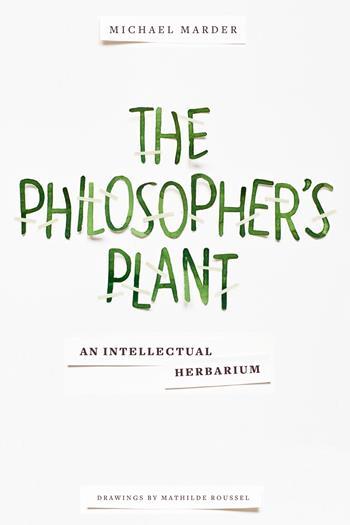Nietzsche's Jungle
This week our featured book is The Philosopher’s Plant: An Intellectual Herbarium, by Michael Marder, with drawings by Mathilde Roussel. In The Philosopher’s Plant, Marder takes a close look at how different forms of plant life played important roles in the work of philosophers throughout history. Today, we are happy to present a blog post crossposted from Marder’s LARB Channel adapted from Marder’s chapter on Nietzsche in The Philosopher’s Plant.
Don’t forget to enter our book giveaway for a chance to win a free copy of The Philosopher’s Plant!
Nietzsche’s Jungle
Michael Marder
Rumor has it that Friedrich Nietzsche’s mental breakdown, from which he never recovered, began on January 3, 1889, when in broad daylight he embraced a horse that was being whipped on a street in Turin, Italy. It is, of course, tempting to see in this “mad” gesture a kind of cross-species identification of a beleaguered philosopher with an abused animal. We will never know with any degree of certainty what Nietzsche felt or thought at that precise moment. But we might surmise from his writings the common foundation of life, shared by humans, animals, and even plants. The name of this foundation is the will to power.
For Nietzsche, an attempt to understand life in all its manifestations could not afford to exclude either animals or plants from the general formula that only philosophy, rather than biology, could get at. Human, animal, and vegetal vitalities had to be viewed as variations on the same theme, namely a striving for existence. That is why roughly one year prior to his collapse in Turin, Nietzsche jotted down a question in his notebook: “For what do the trees in a jungle fight each other? For ‘happiness’?” And immediately responded: “—For power!—”[1]. Plato and his followers deduced the fact of vegetal desire from the wilting of plants that were deprived of water and therefore experienced something like thirst. Nietzsche goes further than that. His implicit conclusion is that, beneath a physical craving in all kinds of living creatures, we find a metaphysical longing for power. Or, to put it differently, for being.
Unbeknownst to themselves, contemporary scientists confirm Nietzsche’s hypothesis in describing the outcomes of kin recognition in plants. The specimens of Cakile edentula, for instance, produced more roots when they shared a pot with strangers (plants of the same species, grown from seeds that derived from a different mother plant) than when they germinated in the same pot as their kin (defined as plants grown from seeds collected from the same mother plant).[2] Perhaps, the assumption that roots engage competitive or altruistic behaviors, depending on the identity of their neighbors, is nothing but a projection of human expectations onto non-human nature. Perhaps, Nietzsche’s interpretation of the “fight” among trees growing in a jungle is also a theoretical fiction, which, in turn, naturalizes the struggle for survival in human societies. But, having said that, we ought to look for the philosophical, rather than bio-anthropological, sense of the will to power in order to assess its significance for our understanding of plants, as well as of humans.
Growth, or an increase in extension, is the most physical manifestation of the common basis for life in plants, animals, and humans. This is not Nietzsche’s invention; in fact, for the ancient Greeks, nature was a sum total of growth embodied in all kinds of living beings. What is remarkable is his take on power and the will — two terms that we usually do not associate with plants.
Although he depicts trees thriving in the jungle in nearly militaristic terms, their power is strictly ontological. It is the power to be, to persevere in being, without succumbing to entropy and descending into nothingness. Plant behavior, which is expressed in patterns of growth, and human comportment, which is evinced in more complex and sublimated activities, share this goal.
By seeking power — and their place under the sun — humans and plants do not merely exist; they will to be. Of course, unlike us, plants do not face any existential problems and cannot choose to terminate their lives at will. But their willing amounts to the intentionality of life itself, its anonymous and impersonal striving to existence. (In the case of plants, the striving is oriented at once toward the sun and the mineral resources hidden in the soil.) Our more abstract and refined wills, sometimes said to be free, presuppose this material foundation for vitality.
Despite the elegance of the Nietzschean solution to the riddle of life, the question concerning the aggressiveness of the will to power remains. In their willing to be, do trees have to trample their “competitors” in the process? What about the vast array of symbiotic forms of inter-species coexistence one encounters in the jungle and elsewhere? And, for humans, is living at all possible in the absence of cooperation and sharing with others? Finally, where was Nietzsche’s own will to power, when he embraced and wept over a horse in Turin? Did he have to slide into madness to entrust it to an animal, let alone to a plant?
[1] Friedrich Nietzsche, The Will to Power, translated by Walter Kaufman and R.J. Hollingdale (New York: Vintage Books, 1968), 375.
[2] S.A. Dudley & A.L. File, “Kin Recognition in an Annual Plant,” Biology Letters 3, 2007, 435-438.


